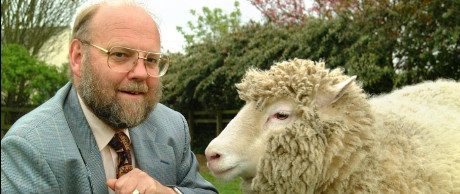Tuesday 12th September 2023, 3:30pm
Roslin Innovation Centre is saddened to hear of the death of Professor Sir Ian Wilmut, who has passed away at the age of 79. The world-renowned embryologist and regenerative medicine expert, led the project to create Dolly the Sheep in 1996 – the first mammal to be cloned from an adult cell – and his work continues to inform and inspire science at Roslin and beyond.
The University of Edinburgh issued the following
statement in recognition of the work and contribution of Sir Ian.

The son of two teachers, Sir Ian was born near Stratford-upon-Avon before the family moved to Yorkshire. It was at school in Scarborough where Ian first became interested in biology.
After school, Sir Ian went to the University of Nottingham, initially to study Agriculture but switched to Animal Science after being inspired by researchers at the University.
His early work at the University of Cambridge, as part of Professor Christopher Polge’s team, focused on the preservation of semen and embryos by freezing. This led to the birth of Frostie, the first calf to be born from a frozen embryo.
Sir Ian moved to the Animal Breeding Research Organisation (ABRO), the predecessor to The Roslin Institute, in 1973. At ABRO, he continued to work with reproductive cells and embryos and became involved in a project to make genetically modified sheep which produced milk containing proteins that could be used to treat human diseases.
As the project progressed, it became clear that a new, more efficient method of making these sheep was needed. Ian led efforts to develop cloning techniques that could be used to make genetically modified sheep, and it was these endeavours that led to the birth of Dolly in 1996.
Dolly’s birth transformed scientific thinking at the time by proving that specialised cells could be used to create an exact copy of the animal they came from.
"Ian was such a great ambassador for Roslin. His reach was global. He led back in the 1980s the team that produced Dolly from which so much has come to the Institute, the University of Edinburgh, and indeed to science in general. We have lost one of the best known science pioneers."
Professor Bruce Whitelaw, Director of the Roslin Institute, the University of EdinburghFollowing the success of the cloning research, Sir Ian began to focus on using cloning to make stem cells which could be utilised in regenerative medicine. He moved to the University of Edinburgh in 2005, becoming the first Director of the MRC Centre for Regenerative Medicine – now part of the newly-formed Institute for Regeneration and Repair – the following year.
Sir Ian continued his links with the Centre as Professor Emeritus, working as part of a group investigating the molecular mechanisms that regulate the reprogramming of cells, with the aim of increasing the efficiency and accuracy of this process.
Following his Parkinson’s diagnosis in 2018, Sir Ian became patron of a research programme set up to enable trials of a new generation of therapies that aim to slow the progression of the disease.
"We are deeply saddened to hear of the passing of Professor Sir Ian Wilmut. He was a titan of the scientific world, leading the Roslin Institute team who cloned Dolly the sheep - the first mammal to be cloned from an adult cell - which transformed scientific thinking at the time. This breakthrough continues to fuel many of the advances that have been made in the field of regenerative medicine that we see today. Our thoughts are with Ian’s family at this time."
Sir Ian will long be remembered for his vast contributions to the field of science and across the University. He will be greatly missed, and our thoughts remain with his wife, family and friends at this time.
The University of Edinburgh